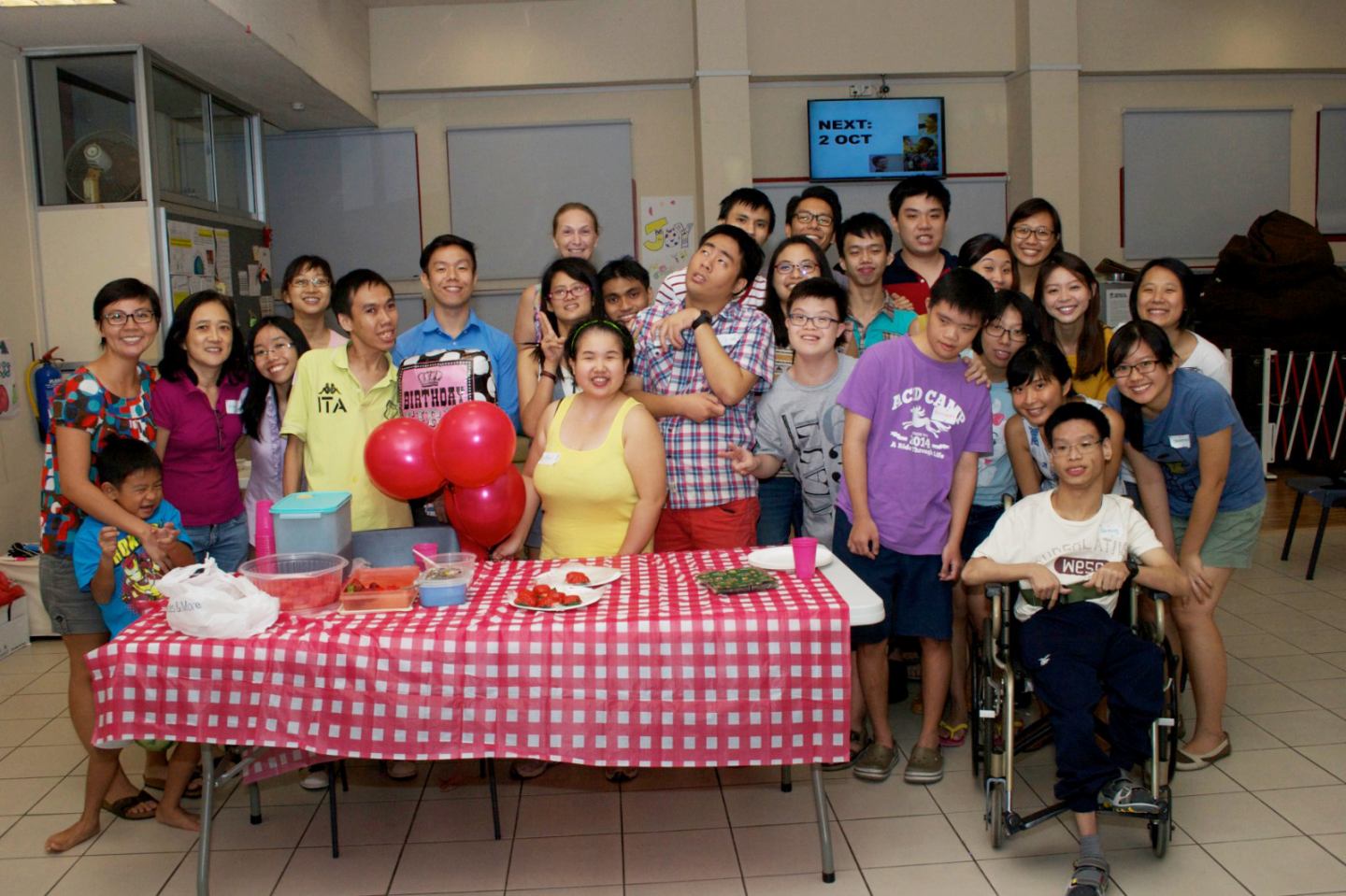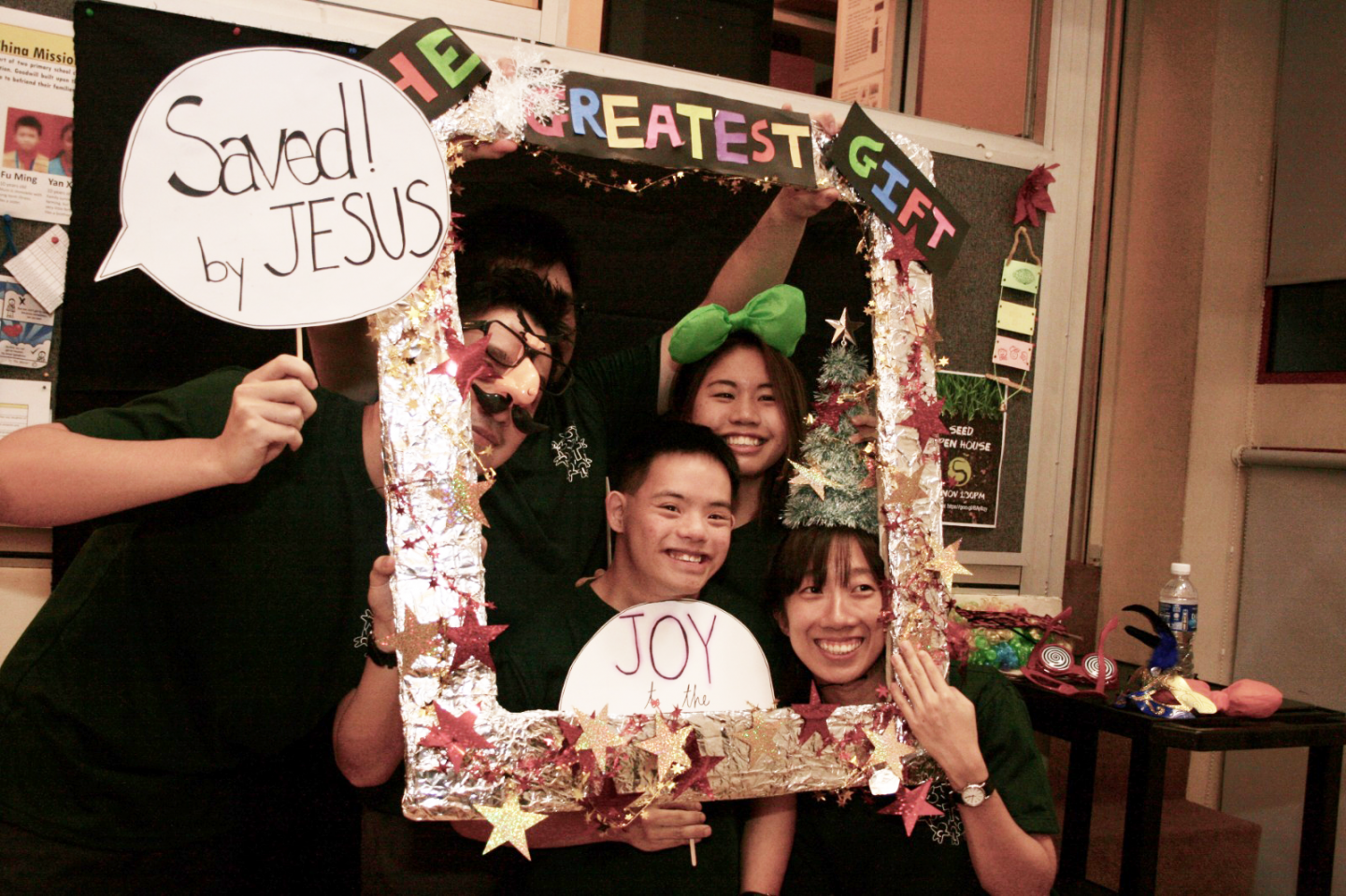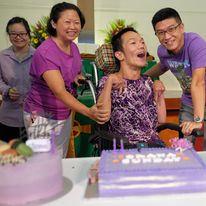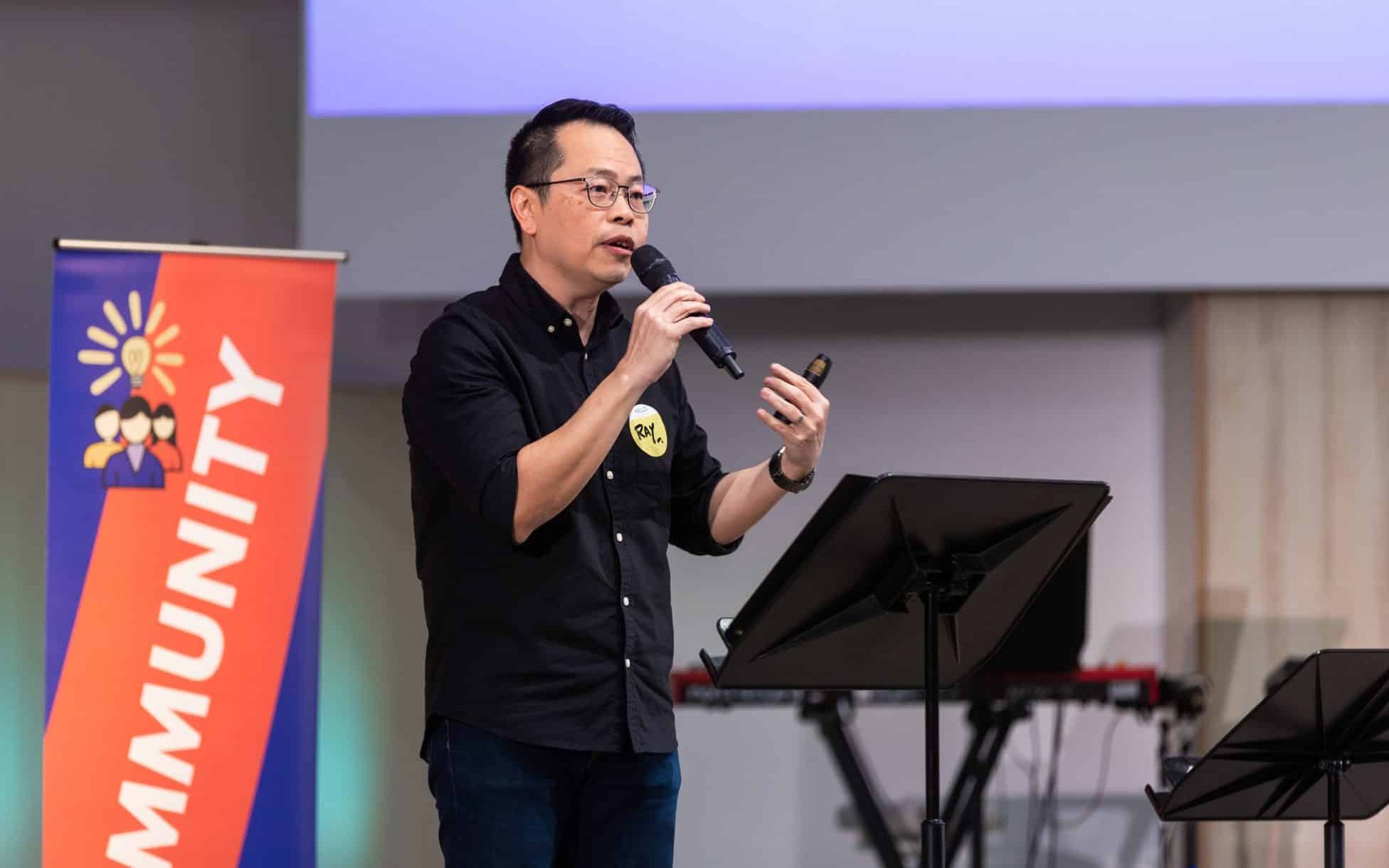How do Sunday Schools meaningfully include children with special needs?
by Gracia Lee // December 2, 2020, 5:08 pm

Jesus Club, a ministry for adults with intellectual disabilities, celebrating the birthday of a member in pre-Covid times. Photo courtesy of Jesus Club.
What is the purpose of Sunday School?
Ask a friend this or do a quick study of Sunday School curricula, and the answer you find will likely be: To teach children about God.
How will a child with special needs, especially one who is intellectually disabled, absorb the lessons and grace of the Bible?
Knowledge is an important part of Christian education. But how will a child with special needs, especially one who is intellectually disabled, absorb the lessons and grace of the Bible?
“I suspect that a child with special needs simply may not be able to absorb information as well as others. They may be considered disruptive (if they have behavioural issues), then they’ll be ostracised because they’re not helping everyone achieve the common goal,” said Leow Wen Pin, president of Koinonia Inclusion Network (KIN), which advocates for disability-inclusive church communities.
Leow was speaking at the second module of the Certificate of Christian Disability Ministry (CCDM) programme, which is a collaboration between KIN and Scripture Union Singapore.
The two-day online module, held on October 31 and November 7, focused on including children with special needs in Sunday School and was attended by 45 participants from 25 churches.
Building unity
How then should we view the purpose of Sunday School?
Turning his attention to Ephesians 4:1-16, Leow shared that while learning propositional truths about God is “fundamental”, Christian education is “ultimately for the purpose of building up unity”.
“At the heart of being in the Church is to be inclusive, to be united.”
Unity is repeated several times in these verses, he noted. For example, in Ephesians 4:3-4, Paul urges the Church to be united as one in the Spirit. Similarly, in Ephesians 4:12-13, Paul says that the work of ministry is “for building up the body of Christ until we all attain to the unity of the faith”.
Leow explained: “Paul says to us that the way you live out your calling as a Church is to live out your unity. This has profound implications for inclusion, because inclusion, ultimately, is not grounded in some high-minded compassion.
“There is something more profound here. God is saying that at the heart of being in the Church is to be inclusive, to be united.”
Therefore, the goal of Sunday School is not just “information transmission”, though teaching the Bible is necessary, he said.
Rather, Sunday School must share the same goal as the Church, which is “to build itself up to be one united body that very much reflects the oneness of God Himself”.
Searching out gifts
When our goal of Sunday School shifts toward helping children grow in unity and Christlikeness, a profound change happens, said Leow.
Firstly, lesson objectives will no longer be merely cognitive but also behavioural and communal.

Members enjoying the photo booth at a Jesus Club Christmas party. Photo courtesy of Jesus Club.
Instead of doing activities that are individualistic, teachers will focus on activities that promote collaboration and cooperation.
Since the Bible says that all believers are gifted by God, “we must search out their gifts”.
Furthermore, students will also be rewarded for not just keeping quiet and maintaining order, but displaying love and consideration to others as well.
Under this new framework, children with special needs will also take on a new role, explained Leow.
They will no longer be regarded as inferior since they, too, are capable of displaying love. Neither will they be seen as disruptive, for they become an opportunity for other children to show love and inclusion.
“With this change in mindset, persons with disabilities shift from being a ‘challenge’ to being a God-given opportunity for classrooms to practise love and inclusion expected in God’s house,” added Leow. “Actually, persons with special needs enable the classroom to be the classroom that God wants to see in His Church.”

Sengkang Methodist Church’s disability ministry, Ohana Ministry, at a celebration service in 2019. Photo courtesy of Sengkang Methodist Church.
Nevertheless, Leow added that he is not wearing rose-tinted glasses and acknowledged that impairments are physiological realities that can be “challenging”.
But we must go beyond that, he urged. Since the Bible says that all believers, including those with special needs, are gifted by God, “we must do the work of searching out their gifts”.
Conceding that it is difficult, he added that the only way we can do this is to “develop an empathetic attentiveness, listen actively and trust that God will show us the way”.
Celebrating parts of one body
During the course, participants also heard from disability professionals about how to identify children with special needs and were equipped to better understand and manage behaviours and meltdowns.
“If we don’t try to include them in our church, then our church is poorer off.”
Through dialogues with parents of children with special needs and people who run special needs ministries, they also learnt how to establish an environment that helps to nurture the faith of those with disabilities.
When asked what keeps them going in ministry, panellist Grace Lim from Jesus Club, a ministry for adults with intellectual disabilities, pointed to 1 Corinthians 12 where Paul describes the Church as the body of Christ, in which each part is indispensable to the body.
Lim said: “If we really believe that God has gifted each member differently with a gift to be exercised in the building up the body of Christ, then even our special needs friends will also have a gift that God has given them for which they are to exercise to build us up.
“If we don’t try to include them in our church, then our church is poorer off because we’re cutting off parts of the body, and we won’t have the gifts that God has given them for our maturity and growth.”
Interested in building a disability-inclusive church?
The Certificate of Christian Disability Ministry (CCDM) programme has three modules, all of which aim to equip churches and its members to build disability-inclusive communities.
The third module, called Growing as One Body: Leading and Pastoring in a Disability Ministry, is now open for registration.
This module aims to provide volunteers and leaders of disability ministries with the necessary theology insight and know-how to effectively start and grow their ministry.
It will be held over two full days via Zoom on March 6, 2021, and March 13, 2021.
Click here for more information.
Koinonia Inclusion Network and Scripture Union Singapore have also collaborated with the Biblical Graduate School of Theology to allow the course to be taken by credit by their students.
FOR MORE STORIES ON INCLUSION, READ:
We are an independent, non-profit organisation that relies on the generosity of our readers, such as yourself, to continue serving the kingdom. Every dollar donated goes directly back into our editorial coverage.
Would you consider partnering with us in our kingdom work by supporting us financially, either as a one-off donation, or a recurring pledge?
Support Salt&Light


